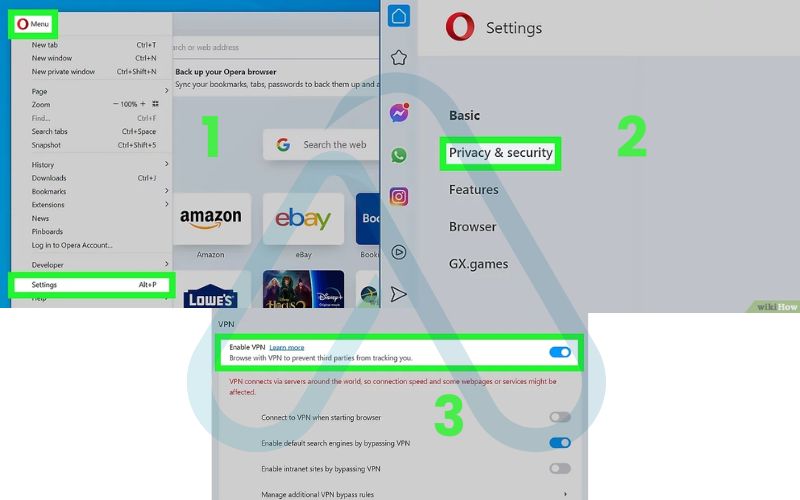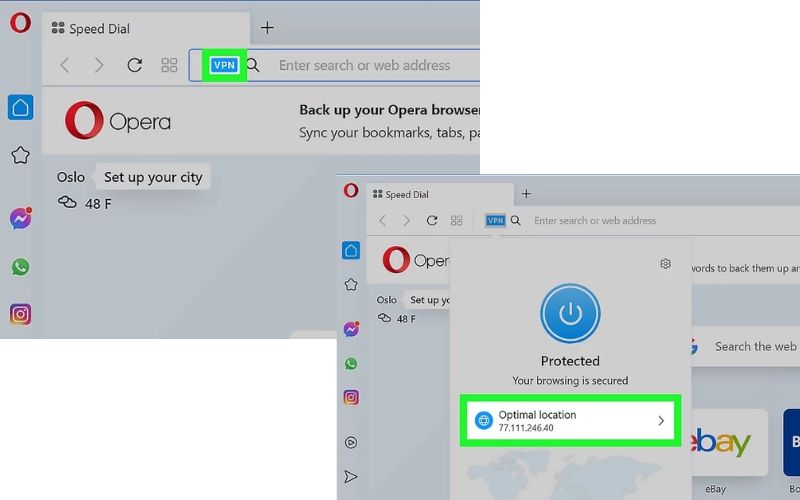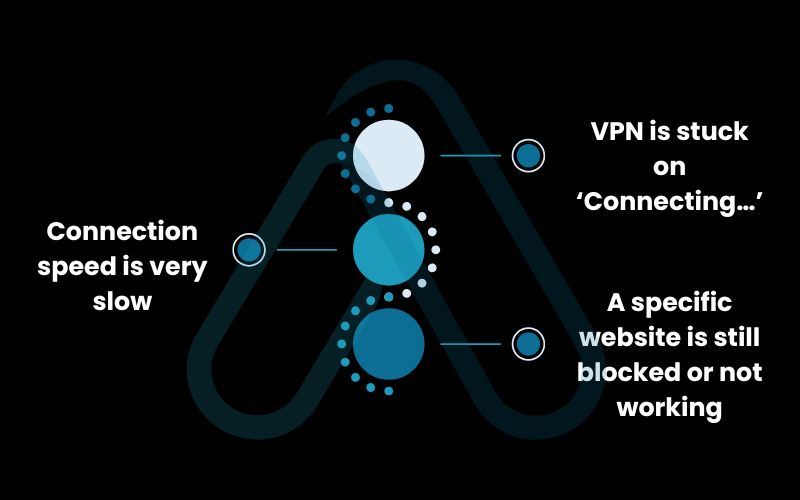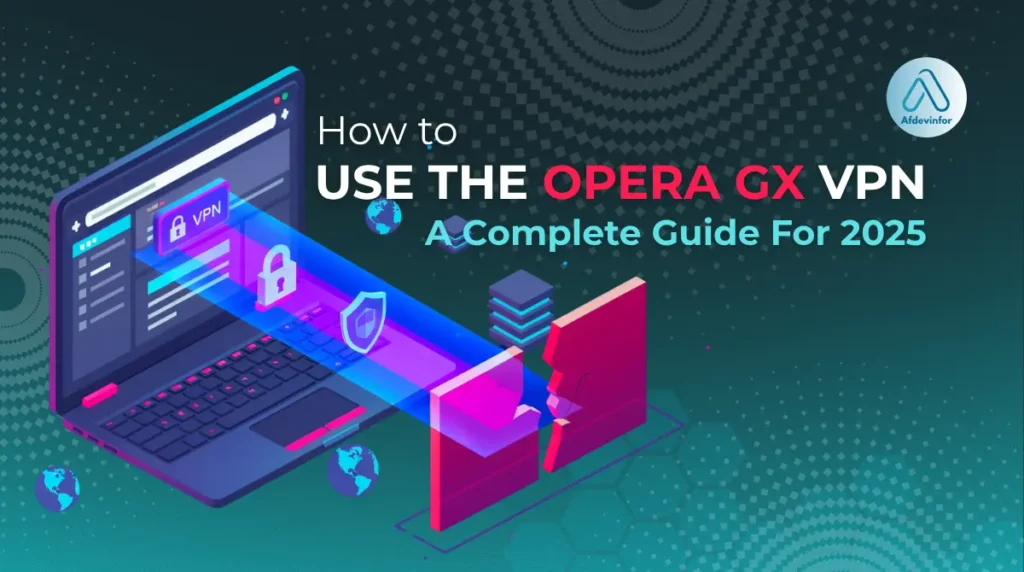As an Opera GX user, you have a powerful free privacy tool at your fingertips, but learning exactly how to use Opera GX VPN and understanding what it truly does is key. After more than a decade of working with cybersecurity tools, I’ve seen countless users misunderstand the capabilities of built-in browser VPNs. They’re incredibly convenient, but they are not a one-size-fits-all security solution. This guide is designed to be your reality check, exploring the full spectrum of Opera GX privacy features.
This guide goes beyond simple setup instructions to give you a complete, honest look at the Opera GX VPN’s strengths and weaknesses.
We’ll cover everything from the initial setup and advanced settings to a critical safety analysis, common troubleshooting steps, and even its status on mobile devices. Let’s dive in.
1. How to enable the Opera GX VPN
Getting started with the VPN is straightforward, which is one of its biggest advantages. Before we begin, it’s crucial to understand a key point I always stress: this is a browser-level VPN. That means it only protects and anonymizes the traffic happening inside your Opera GX browser, not your entire computer. It’s a distinction we’ll explore more later, but it’s vital to set that expectation from the start.
1.1. Activation on Windows & Mac
To enable the VPN in Opera GX, I’ll walk you through the process, which is identical for both Windows and macOS users. Here are the steps:
- Navigate to the browser’s settings. You can do this by clicking the Easy setup menu in the top-right corner and selecting Go to full browser settings, or by simply pressing Alt+P on your keyboard.
- In the Settings menu, scroll down until you find the Privacy & security section.
- Look for the VPN heading and click the switch next to Enable VPN.
Once activated, you will see a blue VPN badge appear on the left side of your address bar. This badge is your visual confirmation that the VPN is active and protecting your browser traffic. This simple process is all it takes to enable VPN Opera GX functionality.

1.2. How to use the VPN controls
Controlling the VPN is just as easy as turning it on. The primary control is located directly in your address bar. Here is what you can do from there:
- One-Click Control: Simply click the blue VPN badge in the address bar. A pop-up will appear with a large on/off switch, allowing you to activate or deactivate the service instantly. This is perfect for when you need to quickly access a local service that requires your real location.
- At-a-Glance Info: The same pop-up shows you useful information, including the amount of data you’ve transferred through the VPN in your current session, your assigned virtual location, and your new public IP address.
2. How to change your location and more
Now that you have the VPN running, it’s time to take control and tailor its settings to your needs. This is where you move from basic use to smart use, whether you’re trying to view region-specific content or just optimizing for speed.
2.1. Selecting your virtual location
One of the most common questions I get is about VPN location change in Opera. Yes, you can change your location, but with some limitations. Here’s how you do it:
- Click the VPN badge in the address bar to open the control pop-up.
- Below the on/off switch, you’ll see a dropdown menu labeled Virtual location. Click on it.
- You will be presented with a list of options.
The location choices are continent-based, not country-specific. The available options are:
- Optimal location: This is the default setting. I recommend keeping this on for general browsing, as Opera will automatically connect you to the fastest available server for your connection.
- Americas
- Europe
- Asia
It’s important to note that you cannot select a specific country or city. This is a key difference between this free service and paid, standalone VPNs.

2.2. Understanding the ‘Bypass VPN for default search engines’ option
In the main VPN settings menu (Settings > Privacy & security > VPN), you’ll find an interesting toggle: ‘Bypass VPN for default search engines’. When this is turned on, search engines like Google will see your real IP address and location, even while the VPN is active for all other sites. This creates a clear trade-off between privacy and convenience. Here is a breakdown of the pros and cons:
| Pros (Bypass ON) | Cons (Bypass ON) |
|---|---|
| You get more relevant, localized search results (e.g., ‘restaurants near me’). | Your search queries are no longer private and can be linked to your real IP address. |
| Avoids constant CAPTCHA requests that search engines often present to VPN traffic. | Reduces the overall privacy benefit of using the VPN for one of your most common online activities. |
My advice is simple: For maximum privacy, keep this setting turned OFF. For convenience and local results, turn it ON. The choice depends on your priority for that browsing session.
3. Is the Opera GX VPN safe to use?
This is where my experience as a tech analyst comes into play. The question of safety isn’t a simple ‘yes’ or ‘no’. To give you an informed answer, we need to look at what this tool does well, and more importantly, what it doesn’t do at all. Assessing browser VPN security requires a nuanced view of its features.
3.1. How Encryption and IP masking protects you
At its core, the Opera GX VPN provides two fundamental layers of protection for your browser traffic. First, it encrypts the connection between your browser and the VPN server. Think of it as sending your mail through a secure, private courier instead of on an open postcard. This makes your browsing activity unreadable to your Internet Service Provider (ISP) or anyone snooping on a public Wi-Fi network. Second, it masks your real IP address, replacing it with one from its own servers. This prevents websites from knowing your physical location and helps anonymize your digital footprint.
3.2. What the Opera GX VPN does not protect
This is the most critical part of our reality check. I cannot stress this enough: the protection ends where the Opera GX browser begins. It ONLY secures the traffic generated from within the browser itself.
| CRITICAL: Browser-Only Protection Any application outside of Opera GX is completely unprotected and will use your real IP address. This includes: |
- Standalone game clients (Steam, Epic Games, Riot Client)
- Communication apps (Discord, Slack, Zoom)
- Torrent clients (qBittorrent, uTorrent)
- Email clients (Outlook, Thunderbird)
- Any other web browser you might have installed (Chrome, Firefox)
Believing the Opera GX VPN protects your entire system is a common and dangerous misconception. For comprehensive security, you need a different class of tool.
3.3. Opera’s logging policy and browser VPNs vs. paid VPNs
Opera states a clear ‘no-logging policy’ for its VPN service, meaning they do not collect or store any information about your browsing activity or original network address. This is a strong point in its favor for privacy. However, it’s still fundamentally different from a premium, standalone VPN service. Here is a direct comparison I’ve put together:
| Feature | Opera GX VPN | Paid Standalone VPN |
|---|---|---|
| Protection Scope | Only Opera GX browser traffic | All internet traffic from your entire device |
| Server Choice | 3 continents (no specific countries) | Dozens or hundreds of countries, often city-level selection |
| Speed | Variable, can be slow under load | Generally optimized for high speed and streaming |
| Advanced Features | None (no kill switch, split tunneling) | Kill switch, dedicated IPs, obfuscated servers, etc. |
| Cost | Free | Monthly/Yearly Subscription |
My conclusion is this: I see the Opera GX VPN as an excellent ‘first layer’ of privacy. It’s fantastic for shielding your IP during casual browsing, adding security on public Wi-Fi, and basic geo-unblocking. But for users who need robust, system-wide security, a paid service is the only real option.
4. Using the VPN for gaming and streaming
Many users are drawn to Opera GX for its gaming-centric features, so it’s natural to wonder how its VPN performs in these demanding scenarios. I’ve tested it extensively, and the results are a mixed bag, so it’s important to manage your expectations.
4.1. The impact on ping and performance with Opera VPN for gaming
Any VPN, by its nature, routes your traffic through an extra server, which will always add latency (ping). The question is, how much? For gaming, low ping is critical. Remember, the Opera VPN for gaming only applies to games you play *in the browser*, not games running from clients like Steam.
Based on my tests, here’s a summary of where it might be useful and where it’s best avoided:
- Good for… Casual browser-based games where latency isn’t a major factor, or potentially bypassing ISP throttling that specifically targets certain types of web traffic.
- Bad for… Any competitive, fast-paced game (browser-based FPS, MOBAs) where every millisecond of ping counts. The added latency will put you at a significant disadvantage.
| My clear recommendation: For casual browser games, it’s fine. For serious, low-latency gaming on clients like Steam or Epic Games, avoid using a browser VPN entirely as it offers no protection for them and will only slow down your connection if you have other web traffic. |
4.2. Unblocking streaming services like Netflix
A popular use for VPNs is accessing geo-restricted content on streaming platforms. Can the Opera GX VPN unblock Netflix libraries from other regions? The short answer is: unreliably. Major streaming services are in a constant battle with VPN providers, and they have become very effective at detecting and blocking traffic from known free VPN servers.
| The Verdict: While you might get lucky and find it works for a short period, do not rely on the Opera GX VPN for consistent access to streaming libraries from other countries. The servers are often blacklisted, and you’ll likely be met with an error message. Paid VPNs with dedicated streaming servers are far more effective for this purpose. |
4.3. A note on torrenting and P2P traffic
This is a non-negotiable point where I must be firm and direct for your own security. The Opera GX VPN is completely unsuitable for torrenting or any other Peer-to-Peer (P2P) file sharing.
| Warning: DO NOT use the Opera GX VPN for torrenting. It does not protect your P2P client (like qBittorrent) and will expose your real IP address to everyone in the torrent swarm. Furthermore, it lacks a kill switch, a critical feature that prevents IP leaks if the VPN connection drops. |
5. Common problems and solutions: Why is my Opera GX VPN not working?
Even simple tools can run into issues. If you find your Opera GX VPN is not working, don’t worry. Over the years, I’ve found that most problems can be solved with a few basic troubleshooting steps. Here’s a guide to fixing the most common issues.
5.1. VPN is stuck on ‘Connecting…’
This is the most frequent complaint I see. If the VPN badge is yellow and says ‘Connecting’ indefinitely, try these fixes in order:
- Toggle It: The simplest fix often works. Click the VPN badge and toggle the main switch off, wait a few seconds, and then toggle it back on.
- Restart the Browser: Close Opera GX completely (ensure it’s not still running in the background) and relaunch it.
- Check Extensions: Other browser extensions, particularly ad-blockers or security tools, can sometimes conflict with the VPN. Try disabling other extensions one by one to see if one is causing the issue.
- Check Your Firewall: Your system’s firewall or antivirus software might be blocking the VPN connection. Temporarily disable it to test if that’s the cause, and if so, add an exception for Opera GX.
5.2. Connection speed is very slow
It’s normal for a VPN to slow your connection slightly, but if it becomes unusable, there are a few things you can do. Here are some quick tips:
- Switch to Optimal Location: If you’ve manually selected a region (e.g., Europe), switch back to ‘Optimal location’. This setting is designed to connect you to the fastest server available.
- Isolate the Problem: Turn the VPN off and run a speed test. This will tell you if the problem is with your base internet connection or the VPN itself.
- Reduce Browser Load: Having dozens of tabs open, especially ones that are actively consuming data, can slow everything down. Try closing unnecessary tabs.
5.3. A specific website is still blocked or not working
Sometimes, even with the VPN on, a site won’t load or will still show a region-blocked message. This usually happens because the site has detected you’re using a known VPN server. Here’s what I suggest:
- Clear Cache and Cookies: Websites can use cookies to remember your real location. Clear your browser’s cache and cookies for that specific site and try again.
- Switch Regions: If you’re connected to Europe, try switching to the Americas or Asia. This will give you a new IP address that might not be on the website’s blocklist.

6. The Opera GX VPN on mobile: Status and alternatives
There’s a lot of outdated information online about the Opera GX VPN’s availability on mobile, which causes significant confusion. As part of this guide, I want to provide a clear, up-to-date answer and offer practical alternatives for mobile users.
6.1. Current status on Android and iOS
Let me be direct to avoid any ambiguity. As of early 2024, the free, built-in VPN that is the subject of this guide is NOT available in the Opera GX mobile app for either Android or iOS. This feature is currently exclusive to the desktop version of the browser. Opera does offer a separate, paid subscription service called ‘VPN Pro’ that works system-wide on mobile, but this is a completely different product from the free tool built into the desktop browser.
6.2. Recommended free VPN alternatives for mobile gamers
If you’re looking for a free VPN for your phone, you need to be very careful, as many are insecure or have shady data practices. However, a few reputable companies offer ‘freemium’ versions of their paid products that I can comfortably recommend. Here are a couple of good starting points:
- ProtonVPN: Their free tier is one of the best I’ve ever reviewed. It offers unlimited data, which is rare for free services, and has a strict no-logs policy backed by a trustworthy company. The trade-off is that free servers can be slow at peak times.
- Windscribe: This service offers a generous free plan with up to 10GB of data per month. It provides good speeds and access to servers in several countries, making it a solid option for occasional use.
Before installing any third-party VPN, I always advise users to read their privacy policy to understand what data, if any, is being collected.
7. FAQs about how to use Opera GX VPN
Here are concise answers to some of the most common questions I hear about the Opera GX VPN.
Is the Opera GX VPN truly free?
Yes. The built-in VPN is free and has no data limit.
Does Opera sell my data when I use the free VPN?
Opera states that the VPN is no-log. They say they don’t store your browsing activity or IP. Still, it’s not the same level of assurance as a fully audited paid VPN.
Can I use the Opera GX VPN to get around school or work firewalls?
Sometimes it works for basic blocks, but advanced firewalls can still detect and block it.
Is the Opera GX VPN a proxy or a real VPN?
Functionally, it behaves more like a secure browser proxy, because it only protects traffic inside Opera GX, not your entire device.
Glossary of key terms
| Term | Full Term | Meaning |
|---|---|---|
| VPN | Virtual Private Network | A service that encrypts your internet traffic and hides your IP address, providing a secure and private connection. |
| IP Address | Internet Protocol Address | A unique string of numbers that identifies a device on the internet, often linked to its physical location. |
| ISP | Internet Service Provider | The company that provides you with access to the internet (e.g., Comcast, Verizon, BT). |
| Ping (Latency) | N/A | A measure of the round-trip time for data to travel from your device to a server and back, measured in milliseconds. Lower is better. |
| P2P | Peer-to-Peer | A decentralized network where participants share files directly with each other rather than from a central server. |
| Encryption | N/A | The process of converting data into a code to prevent unauthorized access, making it unreadable without the correct key. |
| Kill Switch | N/A | A security feature in standalone VPNs that automatically disconnects a device from the internet if the VPN connection fails. |
8. Final thoughts
After a thorough review, my professional assessment of the Opera GX VPN is clear. It’s an incredibly convenient and valuable tool for a specific set of needs, but its limitations are just as important to understand as its features. By using it smartly, you can significantly enhance your daily browsing privacy without any cost or complex setup.
To summarize, here is the bottom line:
- Excellent for Basic Privacy: It’s a fantastic, no-cost option for shielding your IP from websites and encrypting your connection on public Wi-Fi.
- Browser-Only Protection: Its biggest limitation is that it only protects traffic within the Opera GX browser, leaving other applications like Steam and Discord exposed.
- Not for Demanding Tasks: Due to inconsistent performance and detection by streaming sites, it is not reliable for high-speed gaming, streaming, or torrenting.
- A ‘First Layer’ Tool: I see it as a great entry-level privacy tool, but it is not a substitute for a comprehensive, paid VPN service for users with serious security needs.
By understanding both its power and its limits, you can now use the Opera GX VPN smartly and safely. It’s a great feature to have in your toolkit, as long as you know exactly which job it’s built for. For more in-depth guides, explore our Productivity & Automation categories on Afdevinfo.









